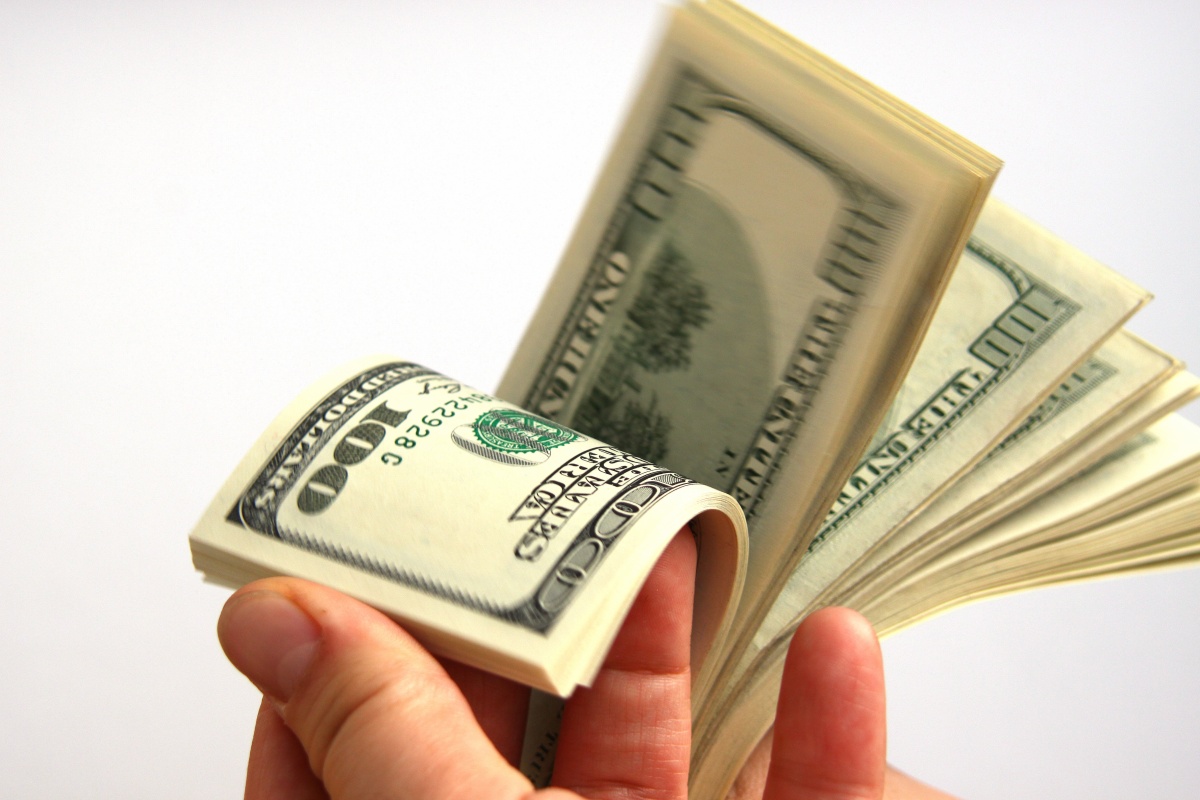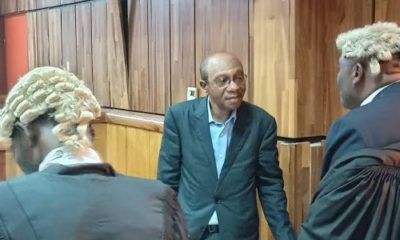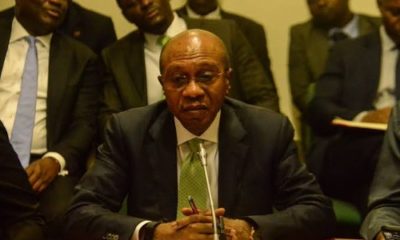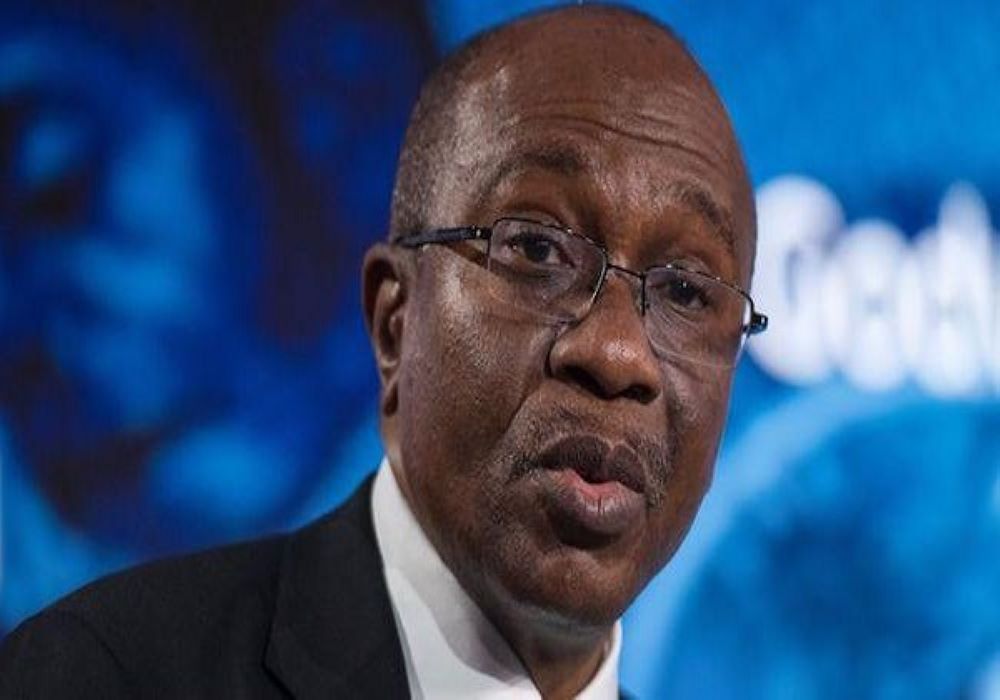Finance
CBN stops sale of forex to BDCs

LAGOS — THE Central Bank of Nigeria, CBN, has stopped, with immediate effect, the sale of foreign exchange, forex, to Bureaux de Change, BDCs, as part of measures to reduce the pressure on the nation’s foreign reserves.
The reserves, which closed last year at $28.364 billion, dropped last weekend to $28.193 billion, showing a depletion by $170 million in the first trading week of this year. To date, it had lost about $3.8 billion since mid last year when CBN announced a recovery to $31.8 billion.
As the new policy shift was being announced, yesterday, the national currency, Naira, completely reversed its Christmas gains, hitting a new low value of N283/USD1 in BDCs and the parallel markets. The currency had gained from low business cycle of Yuletide and informal supplies from returning Nigerians, appreciating to N265/$1.0 against N281/$1.0 it recorded in the middle of last month.
The Governor of the CBN, Mr. Godwin Emefiele, who announced the policy change in Abuja, yesterday, said BDCs are now to source forex from the autonomous market.
He also announced that members of the public can now resume transactions on their domiciliary accounts. That means bank customers can now resume depositing of foreign currencies in their accounts with their banks.
Emefiele’s words: “The bank (CBN) would henceforth discontinue its sales of foreign exchange to BDCs. Operators in this segment of the market would now need to source their foreign exchange from autonomous source. They must, however, note that the CBN would deploy more resources to monitoring these sources to ensure that no operator is in violation of our anti-money laundering laws.
“Despite the fact that Nigeria is the only country in the world where the central bank sells dollars directly to BDCs, operators in this segment have not reciprocated the bank’s gesture to help maintain stability in the market. Whereas the bank has continued to sell Dollars at about N197 per dollar to these operators, they have in turned become greedy in their sales to ordinary Nigerians, with selling rates as high as N250 per dollar.
“Given this rent-seeking behaviour, it is not surprising that since the CBN began to sell foreign exchange to BDCs, the number of operators have risen from a mere 74 in 2005 to 2,786 today. In addition, the CBN receives close to 150 new applications for BDC licences every month.
“Rather than help to achieve the laudable objectives for which they were licensed, the bank has noted the following unintended outcomes:
“Avalanche of rent-seeking operators only interested in widening margins and profits from the foreign exchange market, regardless of prevailing official and inter-bank rates;
“Potential financing of unauthorized transactions with foreign exchange procured from the CBN;
“Gradual dollarization of the Nigerian economy with attendant adverse consequences on the conduct of monetary policy and subtle subversion of cashless policy initiative; and prevailing ownership of several BDCs by the same promoters in order to illegally buy foreign currencies multiple times from the CBN.”
He described the insatiable appetite of BDCs for forex as “a huge hemorrhage on our scarce foreign exchange reserves, and cannot continue especially because we are also concerned that BDCs have become a conduit for illicit trade and financial.”
Emefiele said BDCs operators who cannot cope with the new regulation had the option of turning in their licences to collect their N35 million cautionary deposits with the CBN.
On foreign currency deposits
On foreign currency deposits, Emefiele said: “The bank would now permit commercial banks in the country to begin accepting cash deposits of foreign exchange from their customers.”
According to the governor, the policy objectives for banning the foreign currency deposits have been achieved.
He explained that CBN put the policy in place because it discovered that speculators were withdrawing their Naira deposits and using same to buy up foreign currencies and then depositing same in banks and waiting to change the same at higher rates.
His words: “We discovered that Nigeria was fast approaching the dollarization of the economy. At that time we saw that a lot of people were speculating and there were a lot of speculative attacks on the currency (Naira).
“We saw situations where people were going into their accounts, took the Naira out of their accounts to buy dollars. Some were going to their banks to borrow money to buy dollars and then pass those dollars to their accounts and it got to a point that the banks vaults were full and the banks wanted us to collect the cash and to give them electronic dollars which we said we could not do.
“What we had to do at that time, it was like a flood, a torrent that we had to put break to that flood. At this point, we think, let’s open the tap a little and let’s see whether there will be proper behavior by the operators and the people in the market.”
Policy Change and IMF connection
The CBN’s policy was also coming on the heels of criticism of its stringent forex measures by Managing Director of the International Monetary Fund, IMF, Mrs Christine Lagarde, while on official visit to Nigeria last week.
Financial analysts at Afrinvest Group, a Lagos-based investment house said “with the visit of the IMF boss where emphasis was laid on further flexibility in the management of the currency, we believe the apex bank may review its current position on the pricing of the Naira going forward.”
According to them “the IMF’s position on the management of the Naira was not surprising given the pressure on the value of the Naira in the parallel market which has amplified the calls for further devaluation of the Naira.
“The IMF advocated for more flexibility in the management of the local unit in order to stem the rout on the Naira as the capacity of the CBN to defend the Naira wanes (depleting external reserves).
“Thus, we imagine that the CBN may need to review its position on the pricing of the Naira going forward.
“In conclusion, the visit of the IMF Boss seemed timely as we expect this to give policy makers an opportunity to review their stance on critical issues in the economy within the context of global perception as the country makes hard choices in 2016”.
Vanguard-
Banking
CBN Denies Currency Devaluation

The Central Bank of Nigeria (CBN) has refuted claims of devaluing the.
Earlier reports suggested that the CBN had devalued the Naira, lowering its exchange rate from N631 to the dollar, compared to the previous day’s rate of N461.60 at the Importers and Exporters (I&E) window.
However, the Central Bank of Nigeria (CBN) released a statement on Thursday through its Acting Head of Corporate Communications, Dr. Isa Abdulmumin, categorizing the report as false information.
In the statement titled ‘CBN Has Not Devalued The Naira’, he said the attention of the apex bank was drawn to the news report by an Abuja based newspaper edition of June 1, 2023, titled “CB Devalues Naira To 630/51”.
However, the CBN stated categorically that the news report was replete with outright FALSEHOODS and destabilizing innuendos, ‘reflecting potentially willful ignorance of the said medium as to the workings of the Nigerian Foreign Exchange Market.’
“For the avoidance of doubt, the exchange rate at the Investors’ & Exporters (I&E) window traded this morning (June 1, 2023) at N465/USS1 and has been stable around this rate for a while.
“The public is hereby advised to ignore the news report by Daily Trust in its entirety, as it is speculative and calculated at causing panic in the market,” the CBN spokesman added.
He, therefore, advised media practitioners to verify their facts from the Central Bank of Nigeria before publishing in order not to misinform the public.
Banking
BREAKING: CBN Increases Interest Rate By 0.5%

The interest rate in Nigeria has been raised to 18.5 percent, up by 0.5 percent, from 18 percent where it was pegged in March 2023.
The Central Banks of Nigeria’s (CBN) Monetary Policy Committee (MPC) resolved to this effect at its third meeting of 2023 in Abuja, on Wednesday.
Governor, CBN, Godwin Emefiele, made the disclosure in the communiqué of the MPC’s meeting, thereafter.
While engaging the media at the end of the two-day meeting, Emefiele, said the committee voted to keep the asymmetric corridor at +100 and -700 basis points around the MPR.
In the view of the MPC, rising inflation rate is traceable to the high energy cost and challenges around the supply chain, among others, which lie outside the corridors of the CBN.
Emefiele said, “The current trend in price development would continue to be monitored by the bank with greater collaboration with fiscal authority to address the drivers of inflation.”
Biztellers reports that the CBN had effected six consecutive interest rate increases, which has seen the rate move from 11.5 percent in March 2022 to 18.5 percent in May 2023.
Finance
Dangers Lurk As Nigerians Resort To Refurbished Gas Cylinders

In Nigeria, people have been forced to come up with creative solutions to cope with the effects of inflation and the economic crisis.
These improvised strategies have not only helped individuals save money, but also enabled them to stay afloat during difficult times.
In a concerning development, the recent trend of boycotting the high cost of cooking gas cylinders in Nigeria may pose a greater risk to lives than it does in terms of saving money.
Economy&Lifestyle investigations have revealed that the soaring prices of gas cylinders have reached a point where it has become increasingly challenging for average households to afford them, let alone refill them with gas.
The situation is further exacerbated by the fact that the pump price of kerosene, which would typically serve as an alternative, has become prohibitively expensive.
Upon investigation, it was found that the prices of gas cylinders vary depending on their sizes. A 3kg gas cylinder is priced at N14,000, while a 5kg cylinder costs N16,000. The larger cylinders are even more costly, with a 6kg cylinder priced at N17,000 and a 12.5kg cylinder costing N19,000.
Additionally, the expense continues when it comes to filling these cylinders with cooking gas, as it costs N2,600 for a 3kg cylinder, N5,200 for a 6kg cylinder, N8,950 for a 10.5kg cylinder, and N10,650 for a 12.5kg cylinder.
Consequently, an average household that needs to replace a worn-out 5kg cylinder would have to come up with N20,250 to purchase a new cylinder and fill it with gas, which can be a difficult feat to achieve.
As a result, many people have resorted to refurbishing their old cylinders and trying to use them as best as they can. However, this approach poses a significant danger.
Mrs. Rukayat Adesoji, a trader, shared her experience regarding her gas cylinder, which had become rusted and could no longer stand upright since last month. Due to the exorbitant prices of purchasing new cylinders, she resorted to seeking the assistance of a welder.
The welder patched the legs of the cylinder, repainted it, and ever since then, she has been using the refurbished cylinder for her cooking needs.
She said ““My gas cylinder which was 6kg got rusted and no longer stands erect since last month. When I asked for the price, I was told it was N17, 500. I was discussing it with a friend who advised me to take it to a welder to paint it and construct a new stand. I heeded to her advice and at the end spent just N3, 000 to turn my cooking gas to a brand new.”
Apart from refurbishing cylinders, some people don’t even know when their cylinders will expire. Mrs. Mercy Opara, a hair stylist, falls in that category as she explained: “I am taking my gas cylinder to the welder to spray it for me. It just cost N1, 500.
“The cost of buying a new cylinder is high. I have been using my cylinder for over 7 years and I don’t even know the expiry date. I just pray God blesses me so that I can buy a new one. But this one I am managing will look neat after spraying it for another two years.”
Mr. Adekanbi Joseph, a wielder, said he paints cylinder and “To paint and rebuild a cylinder stand, I charge N4, 500. Many people come here to paint as a new cylinder is now very expensive to get.”
Highlighting the potential dangers of using refurbished cylinders, Mr. Benjamin Hope, the Chief Executive Officer of FKT Cooking gas and general goods, emphasized the risks involved.
He stated that even a brand new cylinder can pose a risk of explosion if the locks are not properly secured after use or if the cylinder filled with gas is moved from one location to another.
He said “A brand new cylinder can explode if the locks are not well keyed after using and if the cylinder filled with gas was moved from one place.
“There are many reasons for the high cost of gas cylinders in Nigeria. One is the cost of importation due to the exchange rate. Another is the increased migration from the use of kerosene to cooking gas which has necessitated increased demand for gas cylinders. You know that in such a case there will be increased importation of cylinders.”he added



















